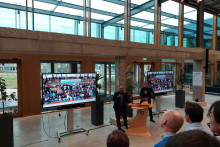The universities have already promised to reinstate Dutch as the language of tuition for all their psychology programmes in the major cities. The same goes for econometrics in Tilburg. And universities across the country say they will admit fewer students to English-taught undergraduate programmes.
The universities estimate that there will soon be 2,000 fewer international Bachelor’s students at Dutch universities compared to the peak year 2022/2023. This puts the total number of international first-year students at around 16,766. (This process has already begun: that total represents a reduction of 700 compared to the current academic year.)
The universities acknowledge the problems associated with the influx of large numbers of students from abroad: some programmes have become overloaded, while several cities face a chronic lack of student accommodation.
Condition
However, the universities have set one condition before agreeing to take matters into their own hands. They want the government to scrap its plans to assess the need for ‘foreign language teaching’ in existing undergraduate programmes.
Essentially, the government wants to filter out what it sees as excessive English-language tuition in undergraduate education: does English serve a purpose or would the programme be just as effective in Dutch? According to the terms of its new bill Internationalisering in balans (Internationalisation in Equilibrium), all higher education programmes should be held to this standard.
Initially, the coalition parties PVV, VVD, NSC and BBB wanted to save 293 million euros a year by reducing the number of English-taught programmes, which in turn would reduce the number of international students. Following a compromise with the Christian opposition parties and JA21, this annual saving fell to 168 million euros, with more than 60 percent affecting the universities and the rest impacting universities of applied sciences.
‘Amputation’
The universities accept that a language assessment makes sense for new programmes, but see no point in applying it to existing programmes. In their view, it can only increase red tape and plunge higher education into uncertainty: it could be years before universities know which programmes will be allowed to continue.
As long as the threat of a language assessment remains, the universities are unwilling to take action themselves. That would mean making sacrifices only to face the possibility of a ‘second round of amputation’, says president of Universities of the Netherlands Caspar van den Berg in an online press conference. Progress would be more efficient and effective if the politicians left them to it.
‘Pro rata’
But exactly how much do individual universities plan to cut? This will be done on a ‘pro rata basis’, says Anton Pijpers, president of Utrecht University and a driving force behind the universities’ plan. However, he declines to mention exact numbers and percentages. Some programmes will shrink, he explains, while others will be allowed to grow.
The growers include Bachelor’s programmes in areas such as STEM, engineering, AI and teaching, where the Dutch labour market has a real shortage of graduates. To address this shortfall, the universities want to be able to recruit more international students.
Other universities could easily resent the scope being given to the four universities of technology to attract students from abroad. Delft, Eindhoven and Wageningen say they will act ‘in solidarity with the other universities’ by converting a small English-taught programme to Dutch or discontinuing it altogether. The University of Twente has made no such pledge.
Politics
The House of Representatives’ education committee is due to debate this issue next week, which explains the timing of the universities’ proposal. Meanwhile, the education minister still needs to work out how to meet opposition demands to soften the impact of his higher education cuts in border regions and areas with a declining population.
The universities have no intention of formalising their plan in a fixed agreement with the government. Not least because the government recently abandoned a previous agreement which promised them additional funding; the universities are now taking legal action to reverse that decision. To guarantee their new plan, the universities will enter into mutually binding agreements.







